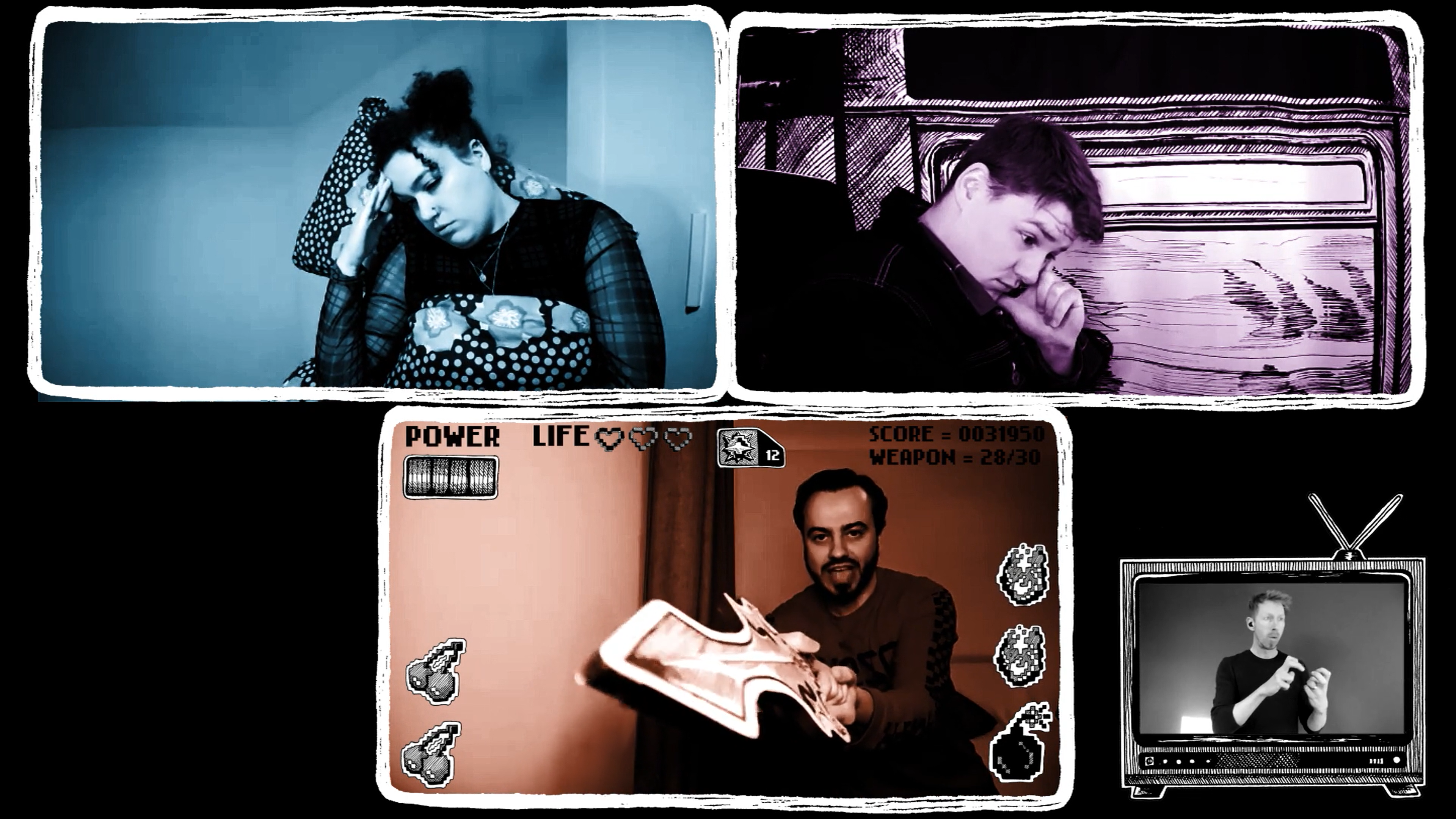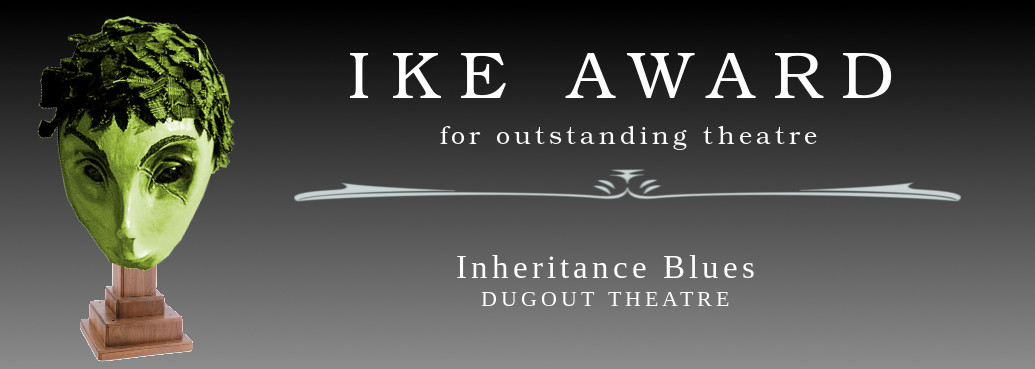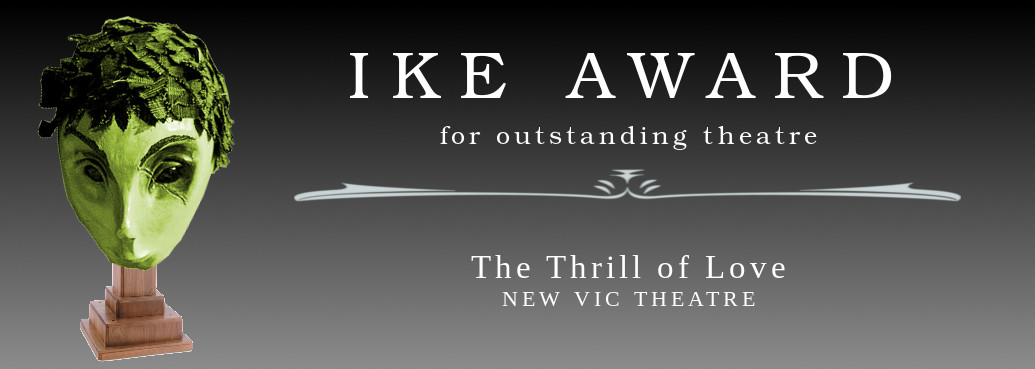So it’s the moment we’ve been building up to. Who do a rate the highest out of everything I’ve seen this year. Most of the time, you can get away with saying “Didn’t they all do well?”, but not here. I have to pick a some winners. Now I have to get really really choosy.
I know there has been some grumbling over “best of” lists being dominated by London. I even sometimes get touted as an alternative to London-centric lists. But please remember this is only a bit of fun. This is a very arbitrary list that is limited to what I saw. North-east theatre and festival fringes feature heavily, but what I get to consider – along with what goes with my own personal tastes – is very heavily influenced by luck. So try not to take this too seriously. Unless you win, in which case you’re welcome to take it very very seriously indeed.
Before we start, a reminder of a couple of rules that have a notable effect here. Things I saw in a previous year are generally not eligible in any subsequent years they perform; this is to avoid have these listings being dominated by the same plays give newer works a fair chance. So one notable omission from this list is Gerry and Sewell. I might have counted the upscaled version at Live Theatre as fresh play under different circumstances, but they got more than enough acclaim in last year’s awards and it’s time to give someone else their moment. The other reminder is that I heavily relax conflict of interest rules here. I have a principle when reviewing that if I’m working sufficiently close to someone that I wouldn’t be comfortable writing a bad review, it would not be appropriate to write any kind of review. But if I thought it was good, you may get recognition here. If you’re wondering if I have anyone in mind, you’ll just have to read this to find out.
The only thing I’ve done differently this year is to announce best individual performances separately. As this list is something that probably means the most to someone, and noting that there were far more people worthy of recognition than the 2-3 allowed in this article, I did a separate list with a top eight. You can read that now. Other than that, let’s go. And as always, we start on Boxing Day with …
Best New Writing:
Most of the time, a great production comes down to the performance, and cannot easily be transferred to another company. For this, I’m looking for the strength in the script. A good production might help you demonstrate how good the script is, but I’m looking for something you could transfer to another competent group of actors and get the same.
 In third place … well, it’s open to debate whether this should count as new writing. I remember whole scenes of this play as a sub-plot of Alan Ayckbourn’s Surprises in 2012. But I always thought the theme of the sub-plot had the most potential and could have been made a play in its own right. That’s exactly what Ayckbourn has done, and Constant Companions is an excellent play with a very believable depiction of a near-future of how emotions in robots evolve to mimic those of humans. Given how quiet the Stephen Joseph Theatre has been over the origins of this play, I can’t help thinking they’re embarrassed by it. If that’s the case, don’t be – it doesn’t matter what the journey was if you have something to be proud of at the end.
In third place … well, it’s open to debate whether this should count as new writing. I remember whole scenes of this play as a sub-plot of Alan Ayckbourn’s Surprises in 2012. But I always thought the theme of the sub-plot had the most potential and could have been made a play in its own right. That’s exactly what Ayckbourn has done, and Constant Companions is an excellent play with a very believable depiction of a near-future of how emotions in robots evolve to mimic those of humans. Given how quiet the Stephen Joseph Theatre has been over the origins of this play, I can’t help thinking they’re embarrassed by it. If that’s the case, don’t be – it doesn’t matter what the journey was if you have something to be proud of at the end.
 I’m giving second place to Surfing the Holyland. Although Erin Hunter’s solo play is written for herself and is very much her own story, the real strength of the play is understanding the complex society that is Israel. It does not take a side in the ongoing war everybody talks about, save how many people are scared of it and others are radicalised by it, but a much stronger theme is the marked divide between a devout religious Israel and laid-back and secular Israel, plus many pieces in this jigsaw. We should not expect plays set in other countries to be set out a single issue discussed by the rest of the world – nobody, for example, demands that every play set in America in the 1960s is about Vietnam. But in an arts world that frequently gets absurdly judgement, it’s good to have something that tries to understand more and judge less.
I’m giving second place to Surfing the Holyland. Although Erin Hunter’s solo play is written for herself and is very much her own story, the real strength of the play is understanding the complex society that is Israel. It does not take a side in the ongoing war everybody talks about, save how many people are scared of it and others are radicalised by it, but a much stronger theme is the marked divide between a devout religious Israel and laid-back and secular Israel, plus many pieces in this jigsaw. We should not expect plays set in other countries to be set out a single issue discussed by the rest of the world – nobody, for example, demands that every play set in America in the 1960s is about Vietnam. But in an arts world that frequently gets absurdly judgement, it’s good to have something that tries to understand more and judge less.
 But first place was something that stood out as a clear winner in the opening minutes. Ikaria begins with a nervous first encounter of Simon and Mia. A lesser writer would have gone for clunky exposition or shoehorned profound observations of twenty-somethings; instead, we have some very convincing (and very difficult to write) awkward exchanging of two people tentatively working out if they are going to be friends or something more. But it’s sadly not just a blossoming love story – the few hints we get of Simon’s troubled past warn us that this might not end well. Instead of Mia rescuing Simon from the darkness, he threatens of engulf her in it too, for it’s not just one person who suffers from depression, but also those closest to him trying – and in this case failing – to protect him from himself. I don’t know how Phillipa Lawford did this; some writers base everything on research, other just go ahead and write characters how they’d expect them to behave. Either way, it was utterly convincing, if a a very tough play to watch.
But first place was something that stood out as a clear winner in the opening minutes. Ikaria begins with a nervous first encounter of Simon and Mia. A lesser writer would have gone for clunky exposition or shoehorned profound observations of twenty-somethings; instead, we have some very convincing (and very difficult to write) awkward exchanging of two people tentatively working out if they are going to be friends or something more. But it’s sadly not just a blossoming love story – the few hints we get of Simon’s troubled past warn us that this might not end well. Instead of Mia rescuing Simon from the darkness, he threatens of engulf her in it too, for it’s not just one person who suffers from depression, but also those closest to him trying – and in this case failing – to protect him from himself. I don’t know how Phillipa Lawford did this; some writers base everything on research, other just go ahead and write characters how they’d expect them to behave. Either way, it was utterly convincing, if a a very tough play to watch.
 Plenty of plays have talked about eating disorders, or eating disordered pushed on by ruthless marketing, so Kate Sumpter hit upon the idea of the equivalent mindset for exercise addiction. Playing a “Spin instructor” in a “spin studio”, the play does get bit confusing as to whether this is a conventional gym or one of these more modern remote online things. Actually, it’s neither of those, and the play gets a lot more surrealistic that what it first seems, but since this is coming to the Arcola next month I won’t give away any more spoilers and leave you to find out yourself if you’re near enough to London.
Plenty of plays have talked about eating disorders, or eating disordered pushed on by ruthless marketing, so Kate Sumpter hit upon the idea of the equivalent mindset for exercise addiction. Playing a “Spin instructor” in a “spin studio”, the play does get bit confusing as to whether this is a conventional gym or one of these more modern remote online things. Actually, it’s neither of those, and the play gets a lot more surrealistic that what it first seems, but since this is coming to the Arcola next month I won’t give away any more spoilers and leave you to find out yourself if you’re near enough to London. But, in spite of the very strong competition, there could only be one winner, and that is Samuel Bailey with
But, in spite of the very strong competition, there could only be one winner, and that is Samuel Bailey with  ne of my highest acclamations, this if for a play whose strength lies in the script. It should be possible for another group to start afresh with the script and still produce something great. This year, there was one thing that stood out. It stands out for reasons other than the script too: I loved the way this was done as a video with the three actors in their own homes. But the clincher for Fow is a tri-lingual play. You can watching this story as an English speaker or a Welsh speaker or a sign language speaker and only pick up part of the story – but the titbits of information you get from your own language, together with visual clues from the other two stories, allows you to fill in the gaps. Alun Saunders’ regular writing (at least the bits I could understand) is also great and put together rounded characters: in English, you get the cynical and apathetic Josh who turns out to be that way for a reason. Writing that is this unconventional is a big gamble: it’s hard to pull off and ruins a play if it doesn’t work out. It’s always difficult in this situation to tell whether the writer knew what he was doing all along, or is was a risk to him too and he had know idea how it would work out. But through boldness or recklessness, Deaf and Fabulous and Taking Flight thoroughly earned the first award.
ne of my highest acclamations, this if for a play whose strength lies in the script. It should be possible for another group to start afresh with the script and still produce something great. This year, there was one thing that stood out. It stands out for reasons other than the script too: I loved the way this was done as a video with the three actors in their own homes. But the clincher for Fow is a tri-lingual play. You can watching this story as an English speaker or a Welsh speaker or a sign language speaker and only pick up part of the story – but the titbits of information you get from your own language, together with visual clues from the other two stories, allows you to fill in the gaps. Alun Saunders’ regular writing (at least the bits I could understand) is also great and put together rounded characters: in English, you get the cynical and apathetic Josh who turns out to be that way for a reason. Writing that is this unconventional is a big gamble: it’s hard to pull off and ruins a play if it doesn’t work out. It’s always difficult in this situation to tell whether the writer knew what he was doing all along, or is was a risk to him too and he had know idea how it would work out. But through boldness or recklessness, Deaf and Fabulous and Taking Flight thoroughly earned the first award.




















